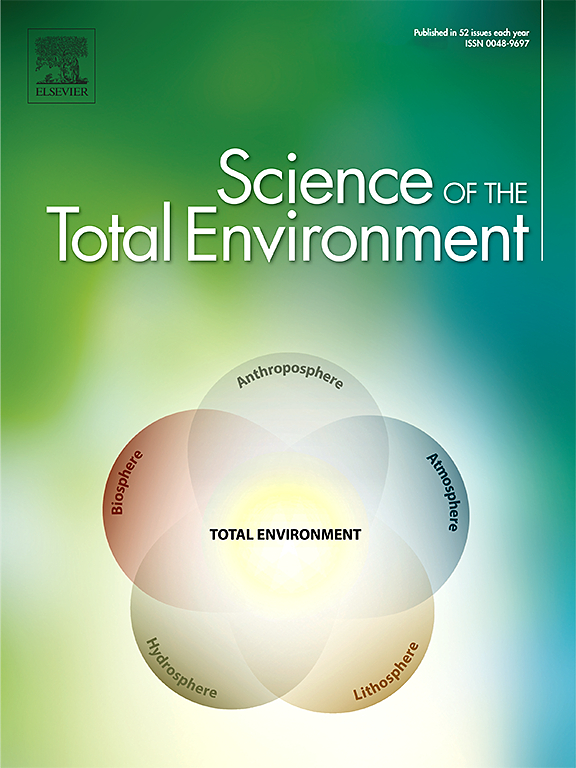A critical review on the application of environmental DNA (eDNA) metagenomics in monitoring and assessing biological communities post marine oil spills
IF 8.2
1区 环境科学与生态学
Q1 ENVIRONMENTAL SCIENCES
引用次数: 0
Abstract
Oil spills pose a serious threat to marine communities, and there is an urgent need for an effective technique to monitor and assess the impacts on biological communities. While traditional methods with low sensitivity, being time-consuming and limited resolution are difficult to meet the application requirements, environmental DNA (eDNA) metagenomics provides an effective tool for comprehensive and long-term monitoring of biomes through non-destructive sampling, which can detect multiple trophic levels at the same time. Meanwhile, this technology provides significant advantages in diversity analysis, community composition and abundance change assessment, and functional gene annotation, enabling a more comprehensive evaluation of oil spills' impacts on marine communities. This review critically summarizes the workflow, including sample collection, DNA extraction, sequencing and data analysis, provides a systematic overview of the application of eDNA metagenomics in marine oil spills, and explores the latest advances in current technologies. Here, we also discuss the technical challenges and future development potential of the method, and emphasize the importance of process standardization, the construction of a global DNA reference database, and artificial intelligence-assisted analysis, which establish a robust theoretical foundation for the systematic application of eDNA metagenomics in marine oil spills monitoring, and new research perspectives on marine ecological pollution management and remediation assessment. Although the method still faces certain technical challenges, its unique advantages in pollution prevention and remediation make it expected to become a core tool for global marine pollution monitoring and assessment.

环境DNA (eDNA)宏基因组学在海洋溢油后生物群落监测和评估中的应用综述
石油泄漏对海洋生物群落构成严重威胁,迫切需要一种有效的技术来监测和评估石油泄漏对海洋生物群落的影响。传统方法灵敏度低、耗时长、分辨率有限,难以满足应用需求,而环境DNA宏基因组学通过非破坏性采样,可同时检测多种营养水平,为生物群落的全面、长期监测提供了有效工具。同时,该技术在生物多样性分析、群落组成和丰度变化评估、功能基因注释等方面具有显著优势,能够更全面地评价溢油对海洋群落的影响。本文综述了eDNA宏基因组学的工作流程,包括样品收集、DNA提取、测序和数据分析,系统概述了eDNA宏基因组学在海洋溢油中的应用,并探讨了当前技术的最新进展。本文还讨论了该方法的技术挑战和未来发展潜力,强调了过程标准化、全球DNA参考数据库建设和人工智能辅助分析的重要性,为eDNA宏基因组学在海洋溢油监测中的系统应用奠定了坚实的理论基础,并为海洋生态污染管理和修复评价提供了新的研究视角。虽然该方法还面临一定的技术挑战,但其在污染防治和修复方面的独特优势,使其有望成为全球海洋污染监测与评估的核心工具。
本文章由计算机程序翻译,如有差异,请以英文原文为准。
求助全文
约1分钟内获得全文
求助全文
来源期刊

Science of the Total Environment
环境科学-环境科学
CiteScore
17.60
自引率
10.20%
发文量
8726
审稿时长
2.4 months
期刊介绍:
The Science of the Total Environment is an international journal dedicated to scientific research on the environment and its interaction with humanity. It covers a wide range of disciplines and seeks to publish innovative, hypothesis-driven, and impactful research that explores the entire environment, including the atmosphere, lithosphere, hydrosphere, biosphere, and anthroposphere.
The journal's updated Aims & Scope emphasizes the importance of interdisciplinary environmental research with broad impact. Priority is given to studies that advance fundamental understanding and explore the interconnectedness of multiple environmental spheres. Field studies are preferred, while laboratory experiments must demonstrate significant methodological advancements or mechanistic insights with direct relevance to the environment.
 求助内容:
求助内容: 应助结果提醒方式:
应助结果提醒方式:


